Unit 4 Earthquake whole unit[上学期]
文档属性
| 名称 | Unit 4 Earthquake whole unit[上学期] |
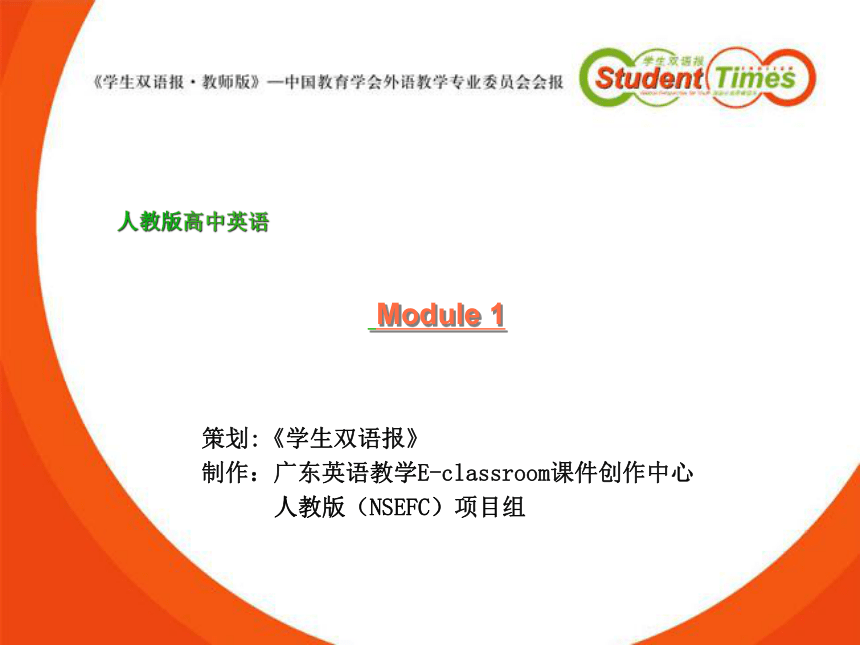
|
|
| 格式 | rar | ||
| 文件大小 | 2.9MB | ||
| 资源类型 | 教案 | ||
| 版本资源 | 人教版(新课程标准) | ||
| 科目 | 英语 | ||
| 更新时间 | 2006-11-06 00:00:00 | ||
图片预览

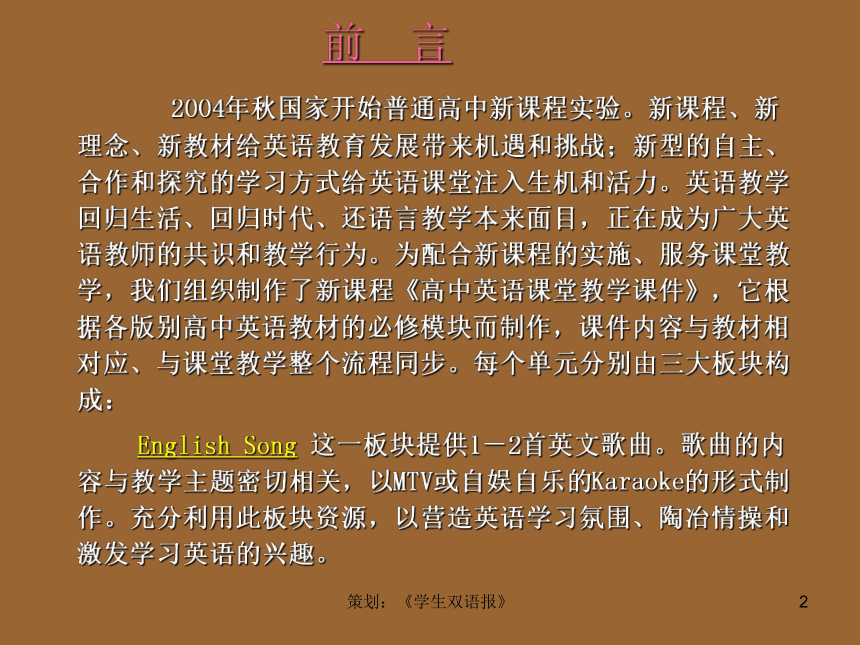
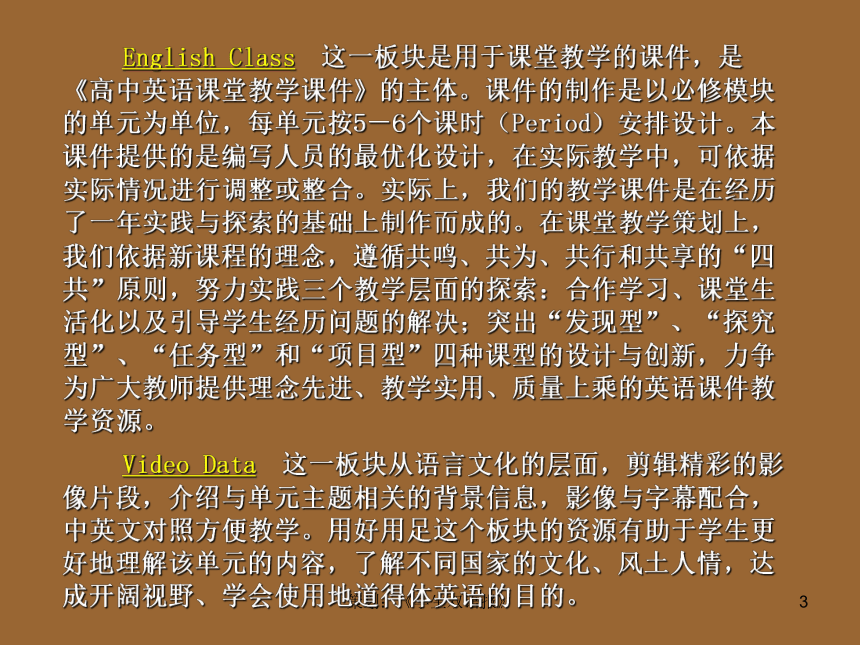
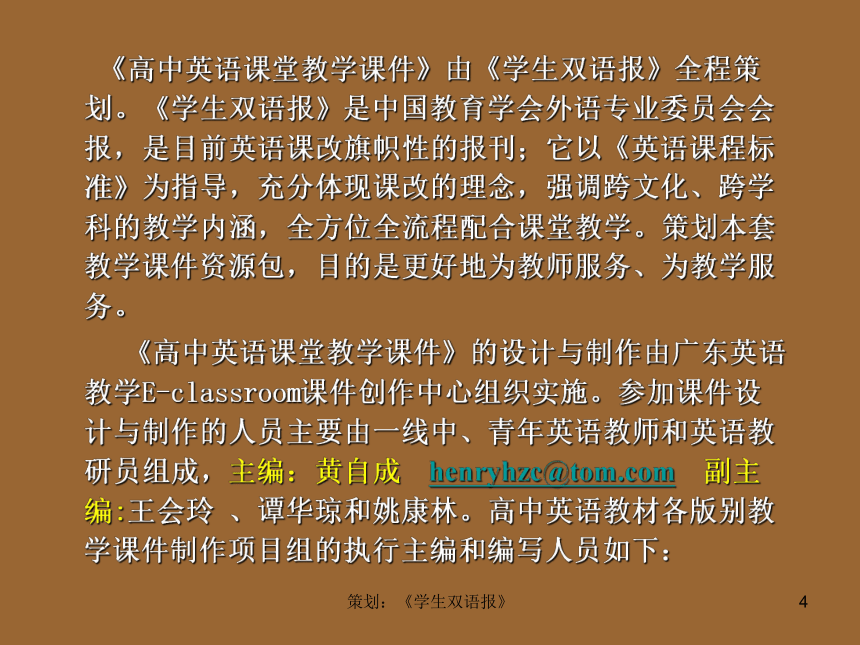
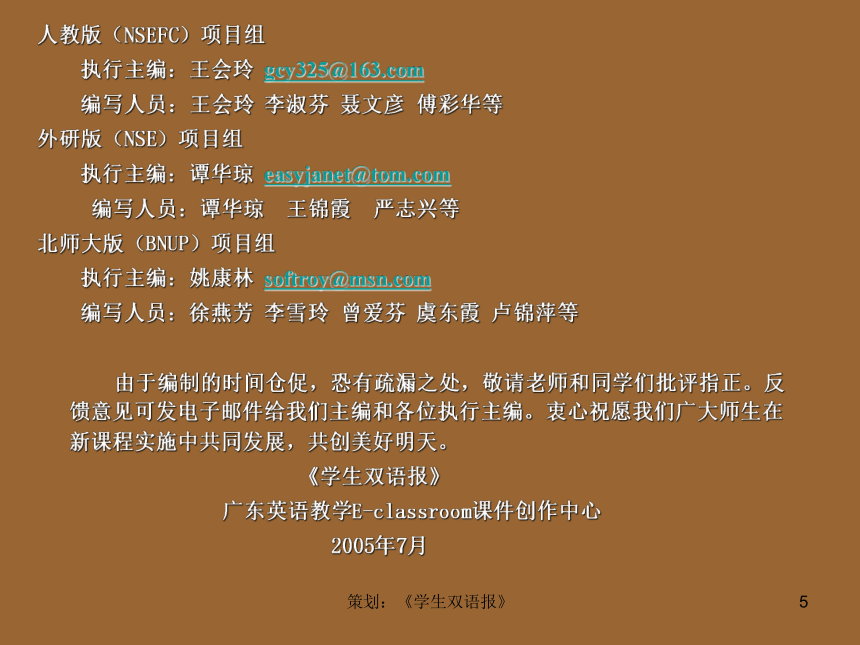
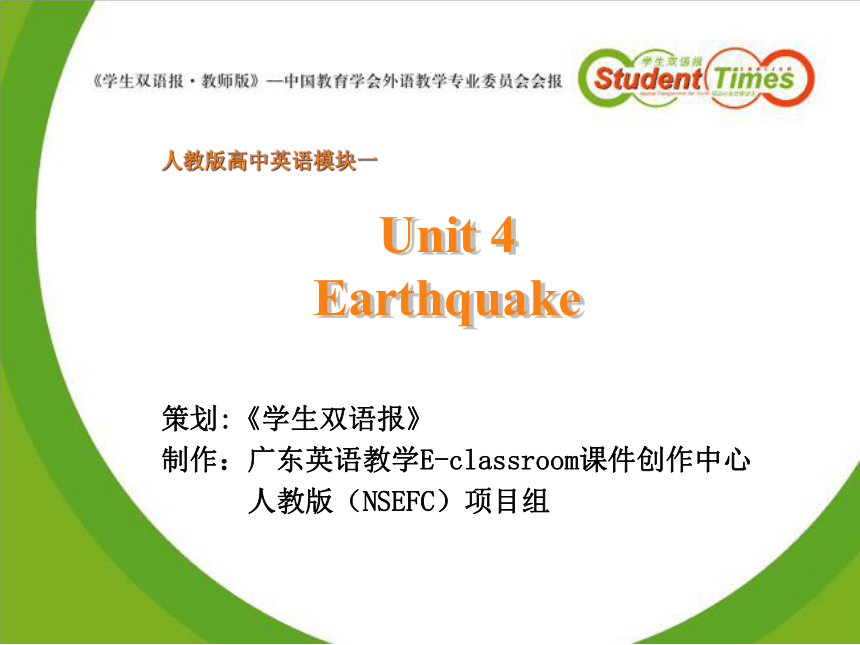
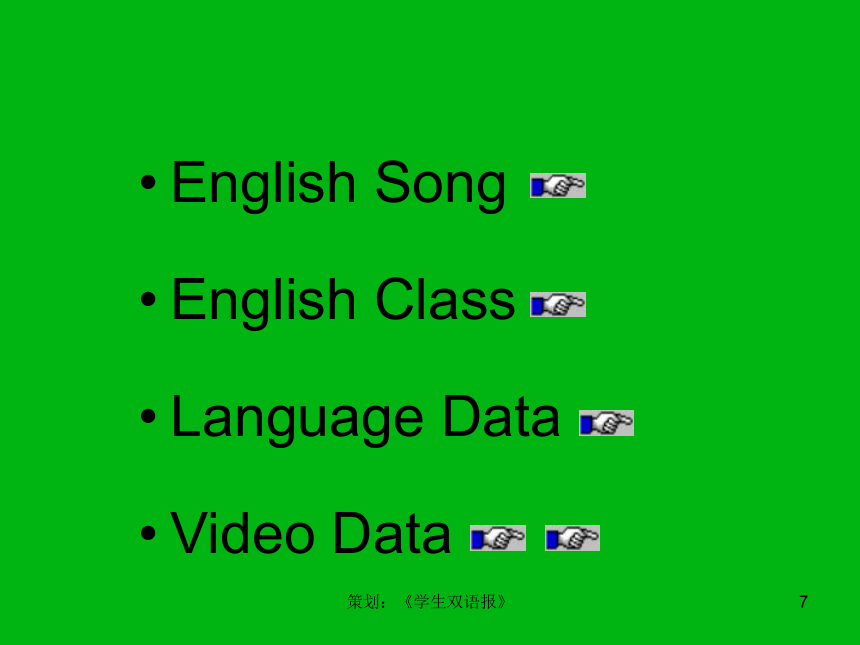
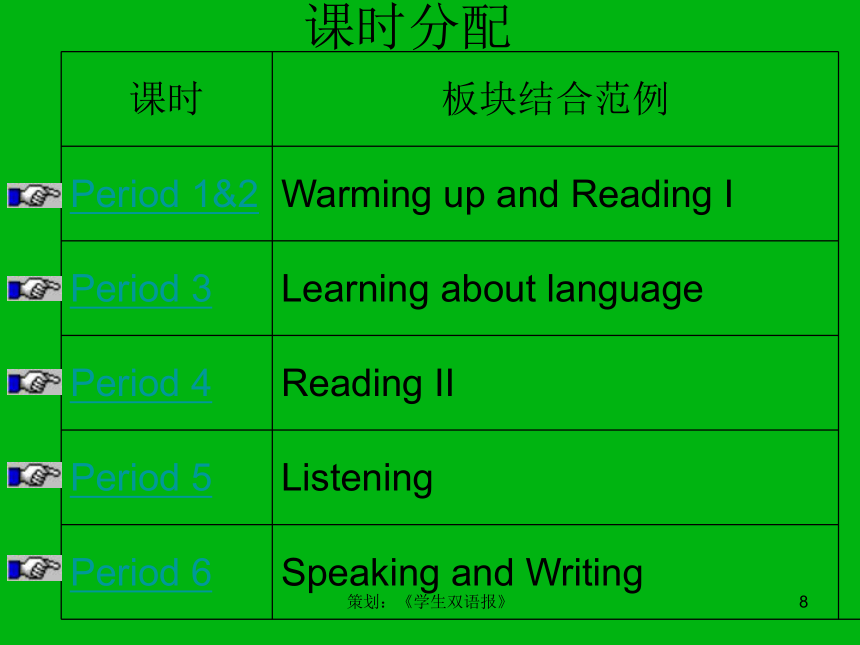
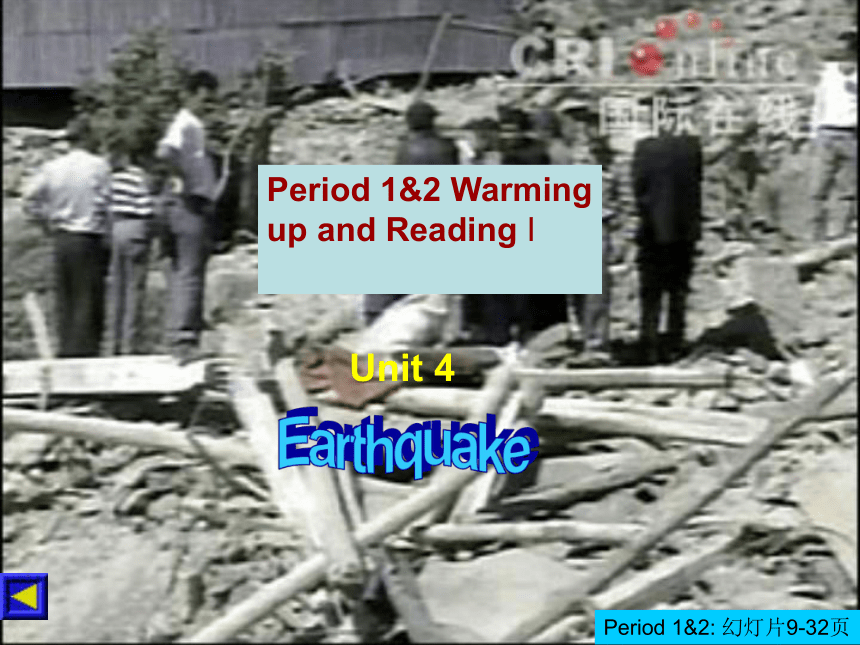
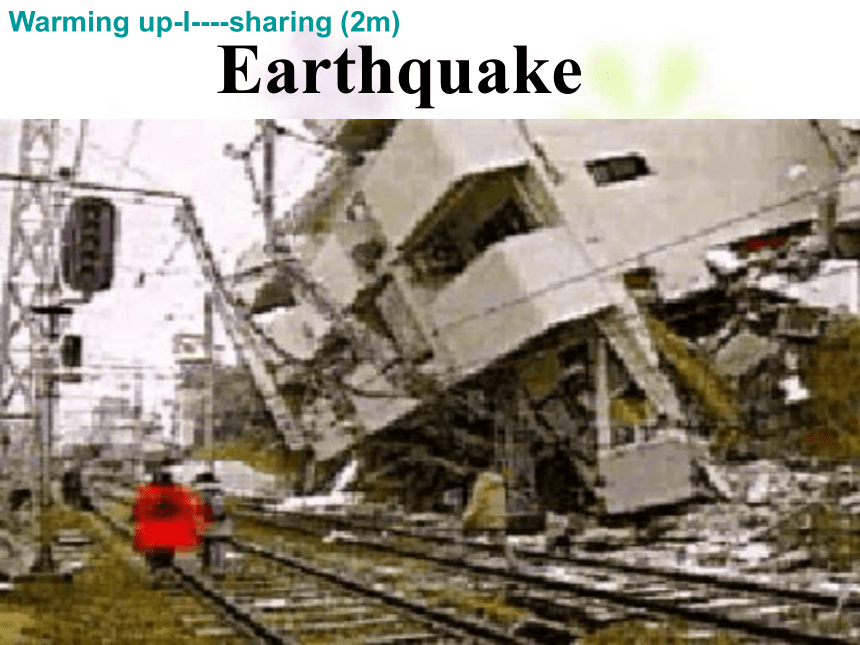
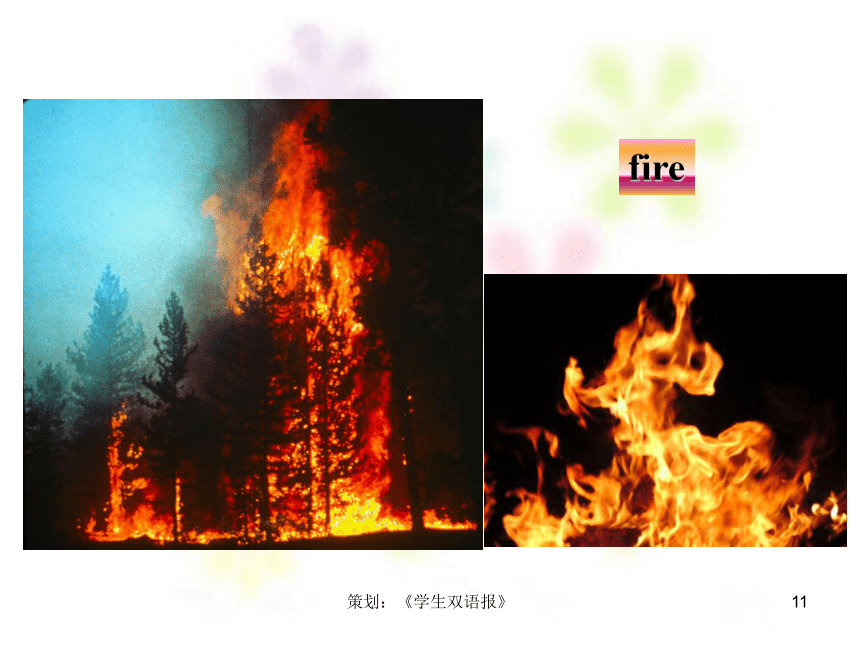
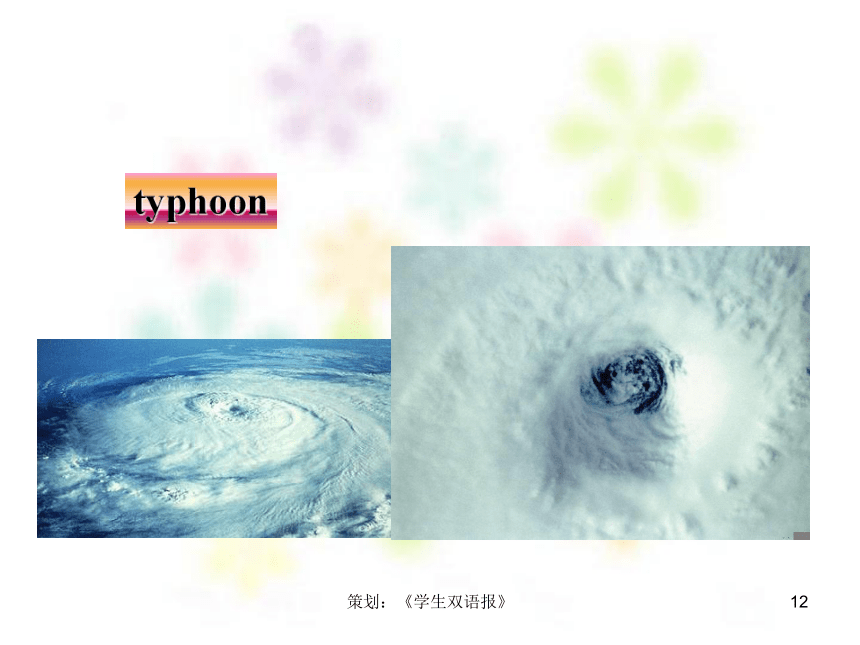
文档简介
课件122张PPT。策划:《学生双语报》1 Module 1 策划:《学生双语报》
制作:广东英语教学E-classroom课件创作中心
人教版(NSEFC)项目组人教版高中英语 策划:《学生双语报》2前 言 2004年秋国家开始普通高中新课程实验。新课程、新理念、新教材给英语教育发展带来机遇和挑战;新型的自主、合作和探究的学习方式给英语课堂注入生机和活力。英语教学回归生活、回归时代、还语言教学本来面目,正在成为广大英语教师的共识和教学行为。为配合新课程的实施、服务课堂教学,我们组织制作了新课程《高中英语课堂教学课件》,它根据各版别高中英语教材的必修模块而制作,课件内容与教材相对应、与课堂教学整个流程同步。每个单元分别由三大板块构成:
English Song 这一板块提供1-2首英文歌曲。歌曲的内容与教学主题密切相关,以MTV或自娱自乐的Karaoke的形式制作。充分利用此板块资源,以营造英语学习氛围、陶冶情操和激发学习英语的兴趣。策划:《学生双语报》3 English Class 这一板块是用于课堂教学的课件,是《高中英语课堂教学课件》的主体。课件的制作是以必修模块的单元为单位,每单元按5-6个课时(Period)安排设计。本课件提供的是编写人员的最优化设计,在实际教学中,可依据实际情况进行调整或整合。实际上,我们的教学课件是在经历了一年实践与探索的基础上制作而成的。在课堂教学策划上,我们依据新课程的理念,遵循共鸣、共为、共行和共享的“四共”原则,努力实践三个教学层面的探索:合作学习、课堂生活化以及引导学生经历问题的解决;突出“发现型”、“探究型”、“任务型”和“项目型”四种课型的设计与创新,力争为广大教师提供理念先进、教学实用、质量上乘的英语课件教学资源。
Video Data 这一板块从语言文化的层面,剪辑精彩的影像片段,介绍与单元主题相关的背景信息,影像与字幕配合,中英文对照方便教学。用好用足这个板块的资源有助于学生更好地理解该单元的内容,了解不同国家的文化、风土人情,达成开阔视野、学会使用地道得体英语的目的。 策划:《学生双语报》4 《高中英语课堂教学课件》由《学生双语报》全程策划。《学生双语报》是中国教育学会外语专业委员会会报,是目前英语课改旗帜性的报刊;它以《英语课程标准》为指导,充分体现课改的理念,强调跨文化、跨学科的教学内涵,全方位全流程配合课堂教学。策划本套教学课件资源包,目的是更好地为教师服务、为教学服务。
《高中英语课堂教学课件》的设计与制作由广东英语教学E-classroom课件创作中心组织实施。参加课件设计与制作的人员主要由一线中、青年英语教师和英语教研员组成,主编:黄自成 henryhzc@tom.com 副主编:王会玲 、谭华琼和姚康林。高中英语教材各版别教学课件制作项目组的执行主编和编写人员如下:
策划:《学生双语报》5人教版(NSEFC)项目组
执行主编:王会玲 gcy325@163.com
编写人员:王会玲 李淑芬 聂文彦 傅彩华等
外研版(NSE)项目组
执行主编:谭华琼 easyjanet@tom.com
编写人员:谭华琼 王锦霞 严志兴等
北师大版(BNUP)项目组
执行主编:姚康林 softroy@msn.com
编写人员:徐燕芳 李雪玲 曾爱芬 虞东霞 卢锦萍等
由于编制的时间仓促,恐有疏漏之处,敬请老师和同学们批评指正。反馈意见可发电子邮件给我们主编和各位执行主编。衷心祝愿我们广大师生在新课程实施中共同发展,共创美好明天。
《学生双语报》
广东英语教学E-classroom课件创作中心
2005年7月 策划:《学生双语报》6 Unit 4 Earthquake策划:《学生双语报》
制作:广东英语教学E-classroom课件创作中心
人教版(NSEFC)项目组
人教版高中英语模块一策划:《学生双语报》7English Song
English Class
Language Data
Video Data策划:《学生双语报》8课时分配策划:《学生双语报》9 Unit 4
Period 1&2 Warming up and Reading IEarthquakePeriod 1&2: 幻灯片9-32页策划:《学生双语报》10EarthquakeWarming up-I----sharing (2m)策划:《学生双语报》11fire策划:《学生双语报》12typhoon策划:《学生双语报》13flood策划:《学生双语报》14SARS/ Spring 2003 The World Trade Center was destroyed/ 2001.9.11策划:《学生双语报》15Earthquake / break out/1976/ TangshanFlood /1998 / South China策划:《学生双语报》16Natural DisasterstyphoonflooddroughtearthquakeWhich disaster may cause the worst damage? earthquakeWarming up-II----sharing (1m)How much do you know about an earthquake?Many people died……People lost their homes…. Many things were destroyed…..Pre-reading----discussion (2m)策划:《学生双语报》19Tangshan,
HebeiJuly 28th, 1976策划:《学生双语报》20Reading A NIGHT
THE EARTH DIDN’T SLEEPFast reading What does the passage mainly talk about?An earthquake happened
in Tangshan in 1976Reading-I----fast reading (2m)策划:《学生双语报》22Sum up the main idea of each part of the passage.
(use one word to describe)Part 1: para 1Part 2: para 2&3Part 3: para 4signsdamagerecoveryReading-II----scanning (2m)Sum up the main idea of each paragraph.
(use one word to describe it)signsdamagesrecoveryPara1Para 2&3Para 4Detail readingReading-III----detailed reading (5m)策划:《学生双语报》24 signs
before
Earthquake Para.1Fill in the blanksStrangerosefellsmellynervouseatjumpedran3:00bright lights策划:《学生双语报》25Damage
caused by
earthquakePara. 2-3Fill in the blanks3:42greatestSteamdirtBricksdamsuselesssteelSandelectricity策划:《学生双语报》26Data(数据) of the nation felt the earthquake .
A huge crack that was kilometres long and
metres wide cut across houses.
In terrible seconds a large city lay in ruins.
of the people died or were injured during the earthquake.
The number of people who were killed or injured reached more than .
All of the city’s hospitals, _ of its factories and buildings and of its homes were gone.
1/3830152/3400,00075%90%Para. 2-3策划:《学生双语报》27 What shall we do if an earthquake happens?DiscussionDiscussion (3m)策划:《学生双语报》28 Don’t be nervous and keep calm.
Don’t try to run out of the classroom.
Protect your head by putting your bag on your head.
Squat or sit down under your desk.
Leave the classroom after the earthquake.策划:《学生双语报》29Tang shan’s new look策划:《学生双语报》30Homework1.Surf the internet to find more information about earthquakes.
2.Finish the “learning about language” part on page 27.
3.Finish exercise 1 on page 63.策划:《学生双语报》31Language Points
for Reading I策划:《学生双语报》32Take a break!策划:《学生双语报》33 Unit 4
Period 3 learning about languageEarthquakePeriod 3: 幻灯片33-57页策划:《学生双语报》341. Answer keys for Ex1 on Page27:1 pipe
2 dam
3 shocked
4 injured
5 well
6 canal
7 ruins
8 a great number of
9 at an end
10 bury
11 rise
12 rescue
13 steamWord-consolidation-I (2m)策划:《学生双语报》352. Answer keys for Ex. 2 on page 28: It was a frightening night because a great number of things happened at the same time. The wall of the dam cracked, so the water went all over the fields. It filled the canals and the wells. The water pipes in some buildings burst. The water covered the buildings and had fallen in ruins around the dead and injured animals. People were shocked. They had to bury many of them for health reasons. It was a very sad time.Word-consolidation-II (2m)策划:《学生双语报》363. Answer keys for Ex.3 on page 28:1.one million
2.two-thirds
3.one-third
4.seventy-five percent
5.ninety percent
6.ten thousand
7.one hundred and fifty thousand
8. half a millionC
H
F
E
A
B
D
GWord-consolidation-III(2m)策划:《学生双语报》37Grammar 定语从句 The Attributive Clause Grammar (5m)策划:《学生双语报》38
Titanic is the ship that sank after hitting an iceberg.策划:《学生双语报》39Rose and Jack are the lovers who met on the ship.策划:《学生双语报》40Rosethe lady/meet Jack on TitanicRose is
met Jack on TitanicJackthe young man /want to save Rosethe man /want to kill JackCalJack is
wanted to save RoseCal is wanted to kill Jack.the lady whothe young man whothe man who策划:《学生双语报》41the ship/sink into the oceanthe ship/is the most beautiful
in the world at that time Titanic is
sank into the ocean.Titanic is
was the most beautiful in the word at that time.the ship thatthe ship that策划:《学生双语报》42the Heart of Oceanthe diamond/is worn by RoseThe Heart of Ocean is
was worn by Rose.the diamond/is dropped
into the ocean by RoseThe Heart of Ocean is
was dropped into the ocean by Rose the diamond
thatthe diamond that
策划:《学生双语报》43born in 1847/ man/ invent the first telephone
Bell who was born in 1847 is the man that invented the first telephone. 策划:《学生双语报》44引导定语从句关系代词的用法: that which who whom whose 1.that在从句中作主语或宾语,指人和物 1)A plane is a machine that can fly.( 主语)2)The noodles that I looked were delicious.(宾语)3)Let’s ask the man that is reading the book over there.(主语)4)The girl that we saw yesterday is Jim’sister.(宾语) 策划:《学生双语报》452. Which 在从句中作主语或宾语,指物1) They planted the trees which didn’t need much water. (主语 )3. who whom 在从句中分别作主语和宾语 (口语中who也可作宾语)1) The foreigner who visited our school yesterday is from Canada.(主语)2) The fish which we bought were not fresh. (宾语)2) The boy who broke the window is called Michael.(主语) 策划:《学生双语报》464) Mr. Read is the professor to whom you should write . (宾语)3) The person to whom you just talked is Mr. Li. (宾语) 3) This is the book whose cover is blue.4. whose 在从句中作定语,指人或物1) Miss Flower is the teacher whose house caught fire last week.2) This is the boy whose composition the teacher talked of .策划:《学生双语报》47 The boss in whose company my father worked is a very kind person. 关系代词whose还可以在从句中与它所修饰的词一起作介词宾语NOTE策划:《学生双语报》48 that和which在指物的情况下一般都可以互换, 但在下列情况下, 一般用that而不用which。I am sure she has something (that) you can borrow.I’ve read all the books that are not mine. This is the first book (that) he has read.This is the very book that belongs to him.(1) 先行词为all, everything, nothing, something,
anything, little, much 等不定代词时。(2)先行词被all, every, no, some, any, little, much等
修饰时。(3)先行词被序数词或最高级修饰时。(4)先行词被the only, the very, the same, the last修饰时。NOTE策划:《学生双语报》49Are you clear now? OK . Let’s do some exercise!Function-I----practice (3m)策划:《学生双语报》503. The house ____________ they built in 1987 stayed up in the earthquake. Fill in the blanks with who, whom, that, which or whose1. The earthquake___________ hit the city in 1906 was the biggest in American history.2. We don’t know the number of people ____________ lost their homes in 1906 earthquakethat / which that / who which /that 策划:《学生双语报》516. Harry is the boy ________ mother is our maths teacher .4. A house ____________ is built on sand may fall down in a earthquake. 5. Luckily none of the people ______________ I know were killed in the earthquake .which / thatwho/whom/thatwhose策划:《学生双语报》52Answer keys for “Discovering useful structures”Ex. 2 on Page 281 who
2 that/which
3 which/that
4 whose
5 whoseFunction-II----practice (2m)策划:《学生双语报》531.The famous basketball star, _______ tried to make a comeback, attracted a lot of attention. (北京 2002春季)
A、where B、when C、which D、who
答案 D
真题解析:本题考察定语从句关联词的选择,从句意可知先行词the famous basketball star(著名的篮球明星)是人,所以应用表示人的关联词who。
高考链接策划:《学生双语报》54The film brought the hours back to me _____ I was taken good care of in that far-away village.(NMET 2001)
A、until B、that C、when D、where
答案 C
真题解析:本题考察定语从句的连接词,主句中的先行词the hours被其它成分分割,只要考生能够认清真正的先行词,就不难得出答案,the hours表示时间,所以应该选择一个表示时间的关系副词,即when。高考链接策划:《学生双语报》553._____ is known to everybody, the moon travels around the earth once every month. (NMET2001) A、It B、As C、That D、what
答案 B
真题解析:本题考察as引导非限定性定语从句。as引导从句的意思是“正如……..”,引导的非限定性定语从句修饰整个句子,当as在从句中充当主语时,常用下面的结构:as is know,as is said,as is reported 等,所以本题的答案是B。高考链接策划:《学生双语报》56Homework1.finish the exercises on page 28.
2.surf the internet to find more information about the attributive clause and sum up the rules of it.策划:《学生双语报》57Take a break!策划:《学生双语报》58 Unit 4
Period 4 Reading IIEarthquakePeriod 4: 幻灯片58-75页策划:《学生双语报》59Do you know any other place where the earthquakes easily happen in the world? Warming up----Brainstorming (2m)策划:《学生双语报》60Pacific plateAmerican
plateEurasian plate India plateAfrican
plateAntarctic plateSan Francisco策划:《学生双语报》61US Map?
策划:《学生双语报》62?Pacific
plate
NorthSouthWestEast↖American plate策划:《学生双语报》63The plates are moving constantly. Sometimes these two plates stop and do not move for years. Then Suddenly, they jump and an earthquake is felt. As a result of the movement of these plates, west America near the sea has always been a bad place for earthquakes. ContinentOceanic plate★★策划:《学生双语报》64San Francisco (before the earthquake)策划:《学生双语报》65San Francisco (after the earthquake)策划:《学生双语报》66Read the passage and finish the following exercises.1.Write an adjective to describe how the author feels about the earthquake and what it did.
___________________
Why did you choose these word?
__________________________________Reading I----scanning (2m)策划:《学生双语报》672.Write an adjective to describe how the author feels about the people of San Francisco.
___________________
Why did you choose these word?
__________________________________策划:《学生双语报》68Read the first paragraph in this passage. Then go back and read again the first paragraph of the passage on page 26.Compare the ways both writers give you details about the earthquakes.Reading II----detailed reading (3m)策划:《学生双语报》69How do you know?
______________________________1.Which writer shows more feeling about the earthquake?
A. The writer of the Tangshan quake in 1976
B The writer of the San Francisco in 1906策划:《学生双语报》70Both writers give similar details about_________________________
and___________________________
_______________________________策划:《学生双语报》713.Which one of the following statements is true?
A. Both writers give details of big events before little events.
B Both writers give details of little events before big events.
C Neither writer gives details of big events before little events.策划:《学生双语报》723.Which one of the following statements is not true?
Both writers saw the earthquake he wrote about.
B. Only one writer saw the earthquake he wrote about.
C. Neither writer saw the earthquake he wrote about.策划:《学生双语报》73Thinking:
If you are going to make a speech to honor those who died in the terrible disaster and those who helped the survivors in Tangshan, what would you say?Thinking &writing (5m)策划:《学生双语报》74HomeworkRead the letter and then write a short speech, in which you should follow the following points on page 29.策划:《学生双语报》75Take a break!策划:《学生双语报》76 Unit 4
Period 5 Listening EarthquakePeriod 5: 幻灯片76-85页策划:《学生双语报》77Question: Have you ever experienced a terrible disaster and became a survivor?Pre-listening----prediction (1m)策划:《学生双语报》78Listen to the tape as it tells the story of a man who was a survivor of the great San Francisco earthquake of 1906.Read the following statements and tell whether they are true or false.1.F 2.F 3.T 4.T 5.F 6.F
Listening----(5m)策划:《学生双语报》79Listen to the tape and answer the following questions. When did the man talk about the earthquake: while it was happening or after it had happened? How do you know?
After the earthquake had happened.
The last sentence gives information about the next day.Listening----answering the following questions (5m)策划:《学生双语报》80Listen to the tape and answer the following questions. Is the man calm as he talks about he earthquake? Why or why not?
Yes, the man is calm because he is writing about something a long time after it happened.
策划:《学生双语报》81Listen to the tape and answer the following questions.What was the biggest danger for the man: fires, cows or falling buildings? Why? The falling buildings were his biggest danger and he didn’t know when one might fall on him. He could at least see the fires and cows coming towards him.
策划:《学生双语报》82Listen to the tape and answer the following questions. Where was the man going? He was going to the bay to get on a boat.
策划:《学生双语报》83Listen to the tape and answer the following questions. Have you got any ideas to help this man during the earthquake?
______________________________________
______________________________________(The students’ answers may vary but should demonstrate an understanding of the listening text.)
策划:《学生双语报》84HomeworkFinish the listening task on workbook, page 66.策划:《学生双语报》85Take a break!策划:《学生双语报》86 Unit 4
Period 6 Speaking and WritingEarthquakePeriod 6: 幻灯片86-109页策划:《学生双语报》87What kind of
newspaper
do you usually read?
Speaking task:China daily21 centuryNew York TimesWashington postEnglish weekly……Speaking (4m)策划:《学生双语报》88Have you ever read any
English newspaper or chinese
newspaper? What are they?
Which would you prefer, English newspaper or Chinese newspaper? Why?Discussion:
Discussion (3m)策划:《学生双语报》89an interesting title that
tells the reader what your topic is
Headline
Main ideasDetailsDo you know what an outline is?outlineBrainstorming for writing (3m)策划:《学生双语报》90QuestionsWhy an outline is important?
What should an outline conclude?
Why a headline is important?
What are the steps to finish a newspaper story?
What is the feature of the newspaper story?策划:《学生双语报》91Why an outline is important?
Because an outline will prepare you to write a better story.
What should an outline conclude?
A good outline should have a headline, a list of main idea and a list of important details.
Why a headline is important?
A headline can tell the reader what the topic is, so it can attract the reader’s attention since the reader may not have bought the newspaper before they read the headline.
策划:《学生双语报》92What are the steps to finish a newspaper story?
First, organize the main ideas. Next, put some details into each paragraph.
What is the feature of the newspaper story?
A newspaper story gives the most important news first and the least important news last.
策划:《学生双语报》93Read the example of a newspaper
story on P31.
How many parts is the story divided?
Find the headline, main ideas and details of each paragraph.Pre-writing (3m)策划:《学生双语报》94
Headline :
Main ideasDetailsoutline
importantThe most important news first
the least important news last策划:《学生双语报》95策划:《学生双语报》96策划:《学生双语报》97策划:《学生双语报》98策划:《学生双语报》99策划:《学生双语报》100策划:《学生双语报》101策划:《学生双语报》102策划:《学生双语报》103Example of newspaper story China leads world in traffic death Experts say that road traffic accidents are on the rise and China ranks first in the world in traffic death tolls. Worldwide Statistics show that the global traffic accident death toll amounted to 500,000 in 2003, with the largest share,104,000
reported in China, followed by India with 86,000, the U.S. with 40,000, and Russia with 26,000, said Duan Liren , former deputy director of the Beijing Traffic Management Bureau. Road accidents are
The seventh leading killer in China. 策划:《学生双语报》104 Prepare the outline for a short
newspaper story for China Daily.
Use the example to help you organize
Your outline. Assignment策划:《学生双语报》105策划:《学生双语报》106策划:《学生双语报》107策划:《学生双语报》108策划:《学生双语报》109Take a break!策划:《学生双语报》110Language Data BankLanguage Points for Reading I策划:《学生双语报》111Imagine your home begins to shake and you must leave it right away. (P25)
Shake : vi /vt (shook ,shaken)
Shake hands with sb
Shake one’s head over /at sth
The whole house shook during the explosion.
The explosion shook the house.
Please shake the bottle before taking.
The host shook hands with all the guests.
Nothing can shake our determination to overcome the difficulty.
He shook his head in answer to my question.
right away: right now ; at once ; immediately
I am getting in touch with him right away.
Language Points for Reading I策划:《学生双语报》1122. For three days the water in the village wells rose and fell, rose and fell. (Para 1, Line 1)
rise(rose,risen) vi
go up; get higher; (of the sun, moon, stars,etc.)
come above the horizon; stand up ,
get out of bed
The flood has risen two feet.
She usually rises early in the morning.策划:《学生双语报》113rise & raiserise: 升起; 上升; 上涨(不能用于被动语态)
raise: 举起 ; 使升起; 提高(可用于被动语态)
He raised a heavy box over his head.
We must raise the living standard of the people .
Food prices are still rising.
策划:《学生双语报》1143. A smelly gas came out of the cracks. In the farmyards, the chickens and even the pigs were too nervous to eat. (Para 1, Line 3)
smelly adj. 发臭的
wind----windy dream----dreamy ice----icy
too···to ·····=so that
This book is too difficult for me to read.
=This book is so difficult that I can not read.
策划:《学生双语报》1154. In the city, the water pipes in some buildings cracked and burst. (Para 1, L6)
burst (burst, burst)
(1).vi. break open or in pieces suddenly;
e.g. When he was riding ,the tire burst.
(2).vi. come or go suddenly or violently
e.g. The house burst into flames.
The girl burst into tear.
(3).n. bursting, outbreak
e.g. a burst of laughter/applause
策划:《学生双语报》1165. …went to bed as usual that night. (Para1, Line 8)
as usual 照常,惯常
As usual, it rained on my birthday.
6. It seemed that the world was at an end.(Para 2, Line 1)
at an end 世界末日 come to an end 结束
The meeting came to an end at midnight.
at the end of 在……的尽头/最后
At the end of the road you’ll find a shop.
He is at the end of his patience.策划:《学生双语报》1177. In fifteen terrible seconds a large city lay in ruin. (Para 2, Line 5)
lie(lay,lain) (v.)
to be, remain or be kept in a certain state
e.g. The village lay in ruins after the war.
in ruins: severly damaged or destroyed 毁坏
e.g. An earthquake left the whole town in ruins.
n. be/lie in ruins
sth. left after destruction,decay or downfall 废墟 ,遗迹
v. damage , destroyed 损坏,毁灭
e.g. The fire ruined the house策划:《学生双语报》1188. Two-thirds of the people died or were injured during the earthquake.(para 2, Line 6)
injure : v. to hurt oneself /sb /sth physically受伤
e,.g. He fell of the bicycle in car accident.
Smoking will injure your health.
two-thirds
分子用基数(one, two…),分母用序数词(first, second…..),当分子超过1时,分母的词尾加s
1/6 one-sixth
1/3 one-third
2/3 two-thirds
策划:《学生双语报》1199.People were shocked. (Para 3, Line 7)
shock :n. [U] [C] 打击;震惊, 震动
vt. 使震惊,使惊愕
shocking : adj. 使人震惊的
The news of his wife’s death was a terrible
shook to him.
You will get a shock if you touch the live wire.
I was shocked by his rudeness.
His failure in the exam was shocking to his parents.策划:《学生双语报》120the number of : a quantity of people or things.
a number of : a lot of
reach(v) to achieve or obtain sth.
达成(某事物);达到,获得
e.g. At last we reached a decision.
You’ll understand it when you reach my age.
destroy: v. to damage sth severely; ruin
e.g. An atom bomb would destroy a city.
All his hopes are destroyed.
instead of : in place of; rather than
代替,而不是
e.g. He did the work instead of his father.
I’ll go to the cinema this afternoon
instead of doing my homework. 策划:《学生双语报》121rescue: to save or set free from harm,
danger,or loss
e.g. He rescued the man from drowning.
n. Act of rescuing 解救; 营救
All hope was not lost.不是所有的希望都破灭了。
all not = not all; some but not all .一些,但不是全部
e.g. Not all the boys left.(=Only some of them left)
策划:《学生双语报》122The End
制作:广东英语教学E-classroom课件创作中心
人教版(NSEFC)项目组人教版高中英语 策划:《学生双语报》2前 言 2004年秋国家开始普通高中新课程实验。新课程、新理念、新教材给英语教育发展带来机遇和挑战;新型的自主、合作和探究的学习方式给英语课堂注入生机和活力。英语教学回归生活、回归时代、还语言教学本来面目,正在成为广大英语教师的共识和教学行为。为配合新课程的实施、服务课堂教学,我们组织制作了新课程《高中英语课堂教学课件》,它根据各版别高中英语教材的必修模块而制作,课件内容与教材相对应、与课堂教学整个流程同步。每个单元分别由三大板块构成:
English Song 这一板块提供1-2首英文歌曲。歌曲的内容与教学主题密切相关,以MTV或自娱自乐的Karaoke的形式制作。充分利用此板块资源,以营造英语学习氛围、陶冶情操和激发学习英语的兴趣。策划:《学生双语报》3 English Class 这一板块是用于课堂教学的课件,是《高中英语课堂教学课件》的主体。课件的制作是以必修模块的单元为单位,每单元按5-6个课时(Period)安排设计。本课件提供的是编写人员的最优化设计,在实际教学中,可依据实际情况进行调整或整合。实际上,我们的教学课件是在经历了一年实践与探索的基础上制作而成的。在课堂教学策划上,我们依据新课程的理念,遵循共鸣、共为、共行和共享的“四共”原则,努力实践三个教学层面的探索:合作学习、课堂生活化以及引导学生经历问题的解决;突出“发现型”、“探究型”、“任务型”和“项目型”四种课型的设计与创新,力争为广大教师提供理念先进、教学实用、质量上乘的英语课件教学资源。
Video Data 这一板块从语言文化的层面,剪辑精彩的影像片段,介绍与单元主题相关的背景信息,影像与字幕配合,中英文对照方便教学。用好用足这个板块的资源有助于学生更好地理解该单元的内容,了解不同国家的文化、风土人情,达成开阔视野、学会使用地道得体英语的目的。 策划:《学生双语报》4 《高中英语课堂教学课件》由《学生双语报》全程策划。《学生双语报》是中国教育学会外语专业委员会会报,是目前英语课改旗帜性的报刊;它以《英语课程标准》为指导,充分体现课改的理念,强调跨文化、跨学科的教学内涵,全方位全流程配合课堂教学。策划本套教学课件资源包,目的是更好地为教师服务、为教学服务。
《高中英语课堂教学课件》的设计与制作由广东英语教学E-classroom课件创作中心组织实施。参加课件设计与制作的人员主要由一线中、青年英语教师和英语教研员组成,主编:黄自成 henryhzc@tom.com 副主编:王会玲 、谭华琼和姚康林。高中英语教材各版别教学课件制作项目组的执行主编和编写人员如下:
策划:《学生双语报》5人教版(NSEFC)项目组
执行主编:王会玲 gcy325@163.com
编写人员:王会玲 李淑芬 聂文彦 傅彩华等
外研版(NSE)项目组
执行主编:谭华琼 easyjanet@tom.com
编写人员:谭华琼 王锦霞 严志兴等
北师大版(BNUP)项目组
执行主编:姚康林 softroy@msn.com
编写人员:徐燕芳 李雪玲 曾爱芬 虞东霞 卢锦萍等
由于编制的时间仓促,恐有疏漏之处,敬请老师和同学们批评指正。反馈意见可发电子邮件给我们主编和各位执行主编。衷心祝愿我们广大师生在新课程实施中共同发展,共创美好明天。
《学生双语报》
广东英语教学E-classroom课件创作中心
2005年7月 策划:《学生双语报》6 Unit 4 Earthquake策划:《学生双语报》
制作:广东英语教学E-classroom课件创作中心
人教版(NSEFC)项目组
人教版高中英语模块一策划:《学生双语报》7English Song
English Class
Language Data
Video Data策划:《学生双语报》8课时分配策划:《学生双语报》9 Unit 4
Period 1&2 Warming up and Reading IEarthquakePeriod 1&2: 幻灯片9-32页策划:《学生双语报》10EarthquakeWarming up-I----sharing (2m)策划:《学生双语报》11fire策划:《学生双语报》12typhoon策划:《学生双语报》13flood策划:《学生双语报》14SARS/ Spring 2003 The World Trade Center was destroyed/ 2001.9.11策划:《学生双语报》15Earthquake / break out/1976/ TangshanFlood /1998 / South China策划:《学生双语报》16Natural DisasterstyphoonflooddroughtearthquakeWhich disaster may cause the worst damage? earthquakeWarming up-II----sharing (1m)How much do you know about an earthquake?Many people died……People lost their homes…. Many things were destroyed…..Pre-reading----discussion (2m)策划:《学生双语报》19Tangshan,
HebeiJuly 28th, 1976策划:《学生双语报》20Reading A NIGHT
THE EARTH DIDN’T SLEEPFast reading What does the passage mainly talk about?An earthquake happened
in Tangshan in 1976Reading-I----fast reading (2m)策划:《学生双语报》22Sum up the main idea of each part of the passage.
(use one word to describe)Part 1: para 1Part 2: para 2&3Part 3: para 4signsdamagerecoveryReading-II----scanning (2m)Sum up the main idea of each paragraph.
(use one word to describe it)signsdamagesrecoveryPara1Para 2&3Para 4Detail readingReading-III----detailed reading (5m)策划:《学生双语报》24 signs
before
Earthquake Para.1Fill in the blanksStrangerosefellsmellynervouseatjumpedran3:00bright lights策划:《学生双语报》25Damage
caused by
earthquakePara. 2-3Fill in the blanks3:42greatestSteamdirtBricksdamsuselesssteelSandelectricity策划:《学生双语报》26Data(数据) of the nation felt the earthquake .
A huge crack that was kilometres long and
metres wide cut across houses.
In terrible seconds a large city lay in ruins.
of the people died or were injured during the earthquake.
The number of people who were killed or injured reached more than .
All of the city’s hospitals, _ of its factories and buildings and of its homes were gone.
1/3830152/3400,00075%90%Para. 2-3策划:《学生双语报》27 What shall we do if an earthquake happens?DiscussionDiscussion (3m)策划:《学生双语报》28 Don’t be nervous and keep calm.
Don’t try to run out of the classroom.
Protect your head by putting your bag on your head.
Squat or sit down under your desk.
Leave the classroom after the earthquake.策划:《学生双语报》29Tang shan’s new look策划:《学生双语报》30Homework1.Surf the internet to find more information about earthquakes.
2.Finish the “learning about language” part on page 27.
3.Finish exercise 1 on page 63.策划:《学生双语报》31Language Points
for Reading I策划:《学生双语报》32Take a break!策划:《学生双语报》33 Unit 4
Period 3 learning about languageEarthquakePeriod 3: 幻灯片33-57页策划:《学生双语报》341. Answer keys for Ex1 on Page27:1 pipe
2 dam
3 shocked
4 injured
5 well
6 canal
7 ruins
8 a great number of
9 at an end
10 bury
11 rise
12 rescue
13 steamWord-consolidation-I (2m)策划:《学生双语报》352. Answer keys for Ex. 2 on page 28: It was a frightening night because a great number of things happened at the same time. The wall of the dam cracked, so the water went all over the fields. It filled the canals and the wells. The water pipes in some buildings burst. The water covered the buildings and had fallen in ruins around the dead and injured animals. People were shocked. They had to bury many of them for health reasons. It was a very sad time.Word-consolidation-II (2m)策划:《学生双语报》363. Answer keys for Ex.3 on page 28:1.one million
2.two-thirds
3.one-third
4.seventy-five percent
5.ninety percent
6.ten thousand
7.one hundred and fifty thousand
8. half a millionC
H
F
E
A
B
D
GWord-consolidation-III(2m)策划:《学生双语报》37Grammar 定语从句 The Attributive Clause Grammar (5m)策划:《学生双语报》38
Titanic is the ship that sank after hitting an iceberg.策划:《学生双语报》39Rose and Jack are the lovers who met on the ship.策划:《学生双语报》40Rosethe lady/meet Jack on TitanicRose is
met Jack on TitanicJackthe young man /want to save Rosethe man /want to kill JackCalJack is
wanted to save RoseCal is wanted to kill Jack.the lady whothe young man whothe man who策划:《学生双语报》41the ship/sink into the oceanthe ship/is the most beautiful
in the world at that time Titanic is
sank into the ocean.Titanic is
was the most beautiful in the word at that time.the ship thatthe ship that策划:《学生双语报》42the Heart of Oceanthe diamond/is worn by RoseThe Heart of Ocean is
was worn by Rose.the diamond/is dropped
into the ocean by RoseThe Heart of Ocean is
was dropped into the ocean by Rose the diamond
thatthe diamond that
策划:《学生双语报》43born in 1847/ man/ invent the first telephone
Bell who was born in 1847 is the man that invented the first telephone. 策划:《学生双语报》44引导定语从句关系代词的用法: that which who whom whose 1.that在从句中作主语或宾语,指人和物 1)A plane is a machine that can fly.( 主语)2)The noodles that I looked were delicious.(宾语)3)Let’s ask the man that is reading the book over there.(主语)4)The girl that we saw yesterday is Jim’sister.(宾语) 策划:《学生双语报》452. Which 在从句中作主语或宾语,指物1) They planted the trees which didn’t need much water. (主语 )3. who whom 在从句中分别作主语和宾语 (口语中who也可作宾语)1) The foreigner who visited our school yesterday is from Canada.(主语)2) The fish which we bought were not fresh. (宾语)2) The boy who broke the window is called Michael.(主语) 策划:《学生双语报》464) Mr. Read is the professor to whom you should write . (宾语)3) The person to whom you just talked is Mr. Li. (宾语) 3) This is the book whose cover is blue.4. whose 在从句中作定语,指人或物1) Miss Flower is the teacher whose house caught fire last week.2) This is the boy whose composition the teacher talked of .策划:《学生双语报》47 The boss in whose company my father worked is a very kind person. 关系代词whose还可以在从句中与它所修饰的词一起作介词宾语NOTE策划:《学生双语报》48 that和which在指物的情况下一般都可以互换, 但在下列情况下, 一般用that而不用which。I am sure she has something (that) you can borrow.I’ve read all the books that are not mine. This is the first book (that) he has read.This is the very book that belongs to him.(1) 先行词为all, everything, nothing, something,
anything, little, much 等不定代词时。(2)先行词被all, every, no, some, any, little, much等
修饰时。(3)先行词被序数词或最高级修饰时。(4)先行词被the only, the very, the same, the last修饰时。NOTE策划:《学生双语报》49Are you clear now? OK . Let’s do some exercise!Function-I----practice (3m)策划:《学生双语报》503. The house ____________ they built in 1987 stayed up in the earthquake. Fill in the blanks with who, whom, that, which or whose1. The earthquake___________ hit the city in 1906 was the biggest in American history.2. We don’t know the number of people ____________ lost their homes in 1906 earthquakethat / which that / who which /that 策划:《学生双语报》516. Harry is the boy ________ mother is our maths teacher .4. A house ____________ is built on sand may fall down in a earthquake. 5. Luckily none of the people ______________ I know were killed in the earthquake .which / thatwho/whom/thatwhose策划:《学生双语报》52Answer keys for “Discovering useful structures”Ex. 2 on Page 281 who
2 that/which
3 which/that
4 whose
5 whoseFunction-II----practice (2m)策划:《学生双语报》531.The famous basketball star, _______ tried to make a comeback, attracted a lot of attention. (北京 2002春季)
A、where B、when C、which D、who
答案 D
真题解析:本题考察定语从句关联词的选择,从句意可知先行词the famous basketball star(著名的篮球明星)是人,所以应用表示人的关联词who。
高考链接策划:《学生双语报》54The film brought the hours back to me _____ I was taken good care of in that far-away village.(NMET 2001)
A、until B、that C、when D、where
答案 C
真题解析:本题考察定语从句的连接词,主句中的先行词the hours被其它成分分割,只要考生能够认清真正的先行词,就不难得出答案,the hours表示时间,所以应该选择一个表示时间的关系副词,即when。高考链接策划:《学生双语报》553._____ is known to everybody, the moon travels around the earth once every month. (NMET2001) A、It B、As C、That D、what
答案 B
真题解析:本题考察as引导非限定性定语从句。as引导从句的意思是“正如……..”,引导的非限定性定语从句修饰整个句子,当as在从句中充当主语时,常用下面的结构:as is know,as is said,as is reported 等,所以本题的答案是B。高考链接策划:《学生双语报》56Homework1.finish the exercises on page 28.
2.surf the internet to find more information about the attributive clause and sum up the rules of it.策划:《学生双语报》57Take a break!策划:《学生双语报》58 Unit 4
Period 4 Reading IIEarthquakePeriod 4: 幻灯片58-75页策划:《学生双语报》59Do you know any other place where the earthquakes easily happen in the world? Warming up----Brainstorming (2m)策划:《学生双语报》60Pacific plateAmerican
plateEurasian plate India plateAfrican
plateAntarctic plateSan Francisco策划:《学生双语报》61US Map?
策划:《学生双语报》62?Pacific
plate
NorthSouthWestEast↖American plate策划:《学生双语报》63The plates are moving constantly. Sometimes these two plates stop and do not move for years. Then Suddenly, they jump and an earthquake is felt. As a result of the movement of these plates, west America near the sea has always been a bad place for earthquakes. ContinentOceanic plate★★策划:《学生双语报》64San Francisco (before the earthquake)策划:《学生双语报》65San Francisco (after the earthquake)策划:《学生双语报》66Read the passage and finish the following exercises.1.Write an adjective to describe how the author feels about the earthquake and what it did.
___________________
Why did you choose these word?
__________________________________Reading I----scanning (2m)策划:《学生双语报》672.Write an adjective to describe how the author feels about the people of San Francisco.
___________________
Why did you choose these word?
__________________________________策划:《学生双语报》68Read the first paragraph in this passage. Then go back and read again the first paragraph of the passage on page 26.Compare the ways both writers give you details about the earthquakes.Reading II----detailed reading (3m)策划:《学生双语报》69How do you know?
______________________________1.Which writer shows more feeling about the earthquake?
A. The writer of the Tangshan quake in 1976
B The writer of the San Francisco in 1906策划:《学生双语报》70Both writers give similar details about_________________________
and___________________________
_______________________________策划:《学生双语报》713.Which one of the following statements is true?
A. Both writers give details of big events before little events.
B Both writers give details of little events before big events.
C Neither writer gives details of big events before little events.策划:《学生双语报》723.Which one of the following statements is not true?
Both writers saw the earthquake he wrote about.
B. Only one writer saw the earthquake he wrote about.
C. Neither writer saw the earthquake he wrote about.策划:《学生双语报》73Thinking:
If you are going to make a speech to honor those who died in the terrible disaster and those who helped the survivors in Tangshan, what would you say?Thinking &writing (5m)策划:《学生双语报》74HomeworkRead the letter and then write a short speech, in which you should follow the following points on page 29.策划:《学生双语报》75Take a break!策划:《学生双语报》76 Unit 4
Period 5 Listening EarthquakePeriod 5: 幻灯片76-85页策划:《学生双语报》77Question: Have you ever experienced a terrible disaster and became a survivor?Pre-listening----prediction (1m)策划:《学生双语报》78Listen to the tape as it tells the story of a man who was a survivor of the great San Francisco earthquake of 1906.Read the following statements and tell whether they are true or false.1.F 2.F 3.T 4.T 5.F 6.F
Listening----(5m)策划:《学生双语报》79Listen to the tape and answer the following questions. When did the man talk about the earthquake: while it was happening or after it had happened? How do you know?
After the earthquake had happened.
The last sentence gives information about the next day.Listening----answering the following questions (5m)策划:《学生双语报》80Listen to the tape and answer the following questions. Is the man calm as he talks about he earthquake? Why or why not?
Yes, the man is calm because he is writing about something a long time after it happened.
策划:《学生双语报》81Listen to the tape and answer the following questions.What was the biggest danger for the man: fires, cows or falling buildings? Why? The falling buildings were his biggest danger and he didn’t know when one might fall on him. He could at least see the fires and cows coming towards him.
策划:《学生双语报》82Listen to the tape and answer the following questions. Where was the man going? He was going to the bay to get on a boat.
策划:《学生双语报》83Listen to the tape and answer the following questions. Have you got any ideas to help this man during the earthquake?
______________________________________
______________________________________(The students’ answers may vary but should demonstrate an understanding of the listening text.)
策划:《学生双语报》84HomeworkFinish the listening task on workbook, page 66.策划:《学生双语报》85Take a break!策划:《学生双语报》86 Unit 4
Period 6 Speaking and WritingEarthquakePeriod 6: 幻灯片86-109页策划:《学生双语报》87What kind of
newspaper
do you usually read?
Speaking task:China daily21 centuryNew York TimesWashington postEnglish weekly……Speaking (4m)策划:《学生双语报》88Have you ever read any
English newspaper or chinese
newspaper? What are they?
Which would you prefer, English newspaper or Chinese newspaper? Why?Discussion:
Discussion (3m)策划:《学生双语报》89an interesting title that
tells the reader what your topic is
Headline
Main ideasDetailsDo you know what an outline is?outlineBrainstorming for writing (3m)策划:《学生双语报》90QuestionsWhy an outline is important?
What should an outline conclude?
Why a headline is important?
What are the steps to finish a newspaper story?
What is the feature of the newspaper story?策划:《学生双语报》91Why an outline is important?
Because an outline will prepare you to write a better story.
What should an outline conclude?
A good outline should have a headline, a list of main idea and a list of important details.
Why a headline is important?
A headline can tell the reader what the topic is, so it can attract the reader’s attention since the reader may not have bought the newspaper before they read the headline.
策划:《学生双语报》92What are the steps to finish a newspaper story?
First, organize the main ideas. Next, put some details into each paragraph.
What is the feature of the newspaper story?
A newspaper story gives the most important news first and the least important news last.
策划:《学生双语报》93Read the example of a newspaper
story on P31.
How many parts is the story divided?
Find the headline, main ideas and details of each paragraph.Pre-writing (3m)策划:《学生双语报》94
Headline :
Main ideasDetailsoutline
importantThe most important news first
the least important news last策划:《学生双语报》95策划:《学生双语报》96策划:《学生双语报》97策划:《学生双语报》98策划:《学生双语报》99策划:《学生双语报》100策划:《学生双语报》101策划:《学生双语报》102策划:《学生双语报》103Example of newspaper story China leads world in traffic death Experts say that road traffic accidents are on the rise and China ranks first in the world in traffic death tolls. Worldwide Statistics show that the global traffic accident death toll amounted to 500,000 in 2003, with the largest share,104,000
reported in China, followed by India with 86,000, the U.S. with 40,000, and Russia with 26,000, said Duan Liren , former deputy director of the Beijing Traffic Management Bureau. Road accidents are
The seventh leading killer in China. 策划:《学生双语报》104 Prepare the outline for a short
newspaper story for China Daily.
Use the example to help you organize
Your outline. Assignment策划:《学生双语报》105策划:《学生双语报》106策划:《学生双语报》107策划:《学生双语报》108策划:《学生双语报》109Take a break!策划:《学生双语报》110Language Data BankLanguage Points for Reading I策划:《学生双语报》111Imagine your home begins to shake and you must leave it right away. (P25)
Shake : vi /vt (shook ,shaken)
Shake hands with sb
Shake one’s head over /at sth
The whole house shook during the explosion.
The explosion shook the house.
Please shake the bottle before taking.
The host shook hands with all the guests.
Nothing can shake our determination to overcome the difficulty.
He shook his head in answer to my question.
right away: right now ; at once ; immediately
I am getting in touch with him right away.
Language Points for Reading I策划:《学生双语报》1122. For three days the water in the village wells rose and fell, rose and fell. (Para 1, Line 1)
rise(rose,risen) vi
go up; get higher; (of the sun, moon, stars,etc.)
come above the horizon; stand up ,
get out of bed
The flood has risen two feet.
She usually rises early in the morning.策划:《学生双语报》113rise & raiserise: 升起; 上升; 上涨(不能用于被动语态)
raise: 举起 ; 使升起; 提高(可用于被动语态)
He raised a heavy box over his head.
We must raise the living standard of the people .
Food prices are still rising.
策划:《学生双语报》1143. A smelly gas came out of the cracks. In the farmyards, the chickens and even the pigs were too nervous to eat. (Para 1, Line 3)
smelly adj. 发臭的
wind----windy dream----dreamy ice----icy
too···to ·····=so that
This book is too difficult for me to read.
=This book is so difficult that I can not read.
策划:《学生双语报》1154. In the city, the water pipes in some buildings cracked and burst. (Para 1, L6)
burst (burst, burst)
(1).vi. break open or in pieces suddenly;
e.g. When he was riding ,the tire burst.
(2).vi. come or go suddenly or violently
e.g. The house burst into flames.
The girl burst into tear.
(3).n. bursting, outbreak
e.g. a burst of laughter/applause
策划:《学生双语报》1165. …went to bed as usual that night. (Para1, Line 8)
as usual 照常,惯常
As usual, it rained on my birthday.
6. It seemed that the world was at an end.(Para 2, Line 1)
at an end 世界末日 come to an end 结束
The meeting came to an end at midnight.
at the end of 在……的尽头/最后
At the end of the road you’ll find a shop.
He is at the end of his patience.策划:《学生双语报》1177. In fifteen terrible seconds a large city lay in ruin. (Para 2, Line 5)
lie(lay,lain) (v.)
to be, remain or be kept in a certain state
e.g. The village lay in ruins after the war.
in ruins: severly damaged or destroyed 毁坏
e.g. An earthquake left the whole town in ruins.
n. be/lie in ruins
sth. left after destruction,decay or downfall 废墟 ,遗迹
v. damage , destroyed 损坏,毁灭
e.g. The fire ruined the house策划:《学生双语报》1188. Two-thirds of the people died or were injured during the earthquake.(para 2, Line 6)
injure : v. to hurt oneself /sb /sth physically受伤
e,.g. He fell of the bicycle in car accident.
Smoking will injure your health.
two-thirds
分子用基数(one, two…),分母用序数词(first, second…..),当分子超过1时,分母的词尾加s
1/6 one-sixth
1/3 one-third
2/3 two-thirds
策划:《学生双语报》1199.People were shocked. (Para 3, Line 7)
shock :n. [U] [C] 打击;震惊, 震动
vt. 使震惊,使惊愕
shocking : adj. 使人震惊的
The news of his wife’s death was a terrible
shook to him.
You will get a shock if you touch the live wire.
I was shocked by his rudeness.
His failure in the exam was shocking to his parents.策划:《学生双语报》120the number of : a quantity of people or things.
a number of : a lot of
reach(v) to achieve or obtain sth.
达成(某事物);达到,获得
e.g. At last we reached a decision.
You’ll understand it when you reach my age.
destroy: v. to damage sth severely; ruin
e.g. An atom bomb would destroy a city.
All his hopes are destroyed.
instead of : in place of; rather than
代替,而不是
e.g. He did the work instead of his father.
I’ll go to the cinema this afternoon
instead of doing my homework. 策划:《学生双语报》121rescue: to save or set free from harm,
danger,or loss
e.g. He rescued the man from drowning.
n. Act of rescuing 解救; 营救
All hope was not lost.不是所有的希望都破灭了。
all not = not all; some but not all .一些,但不是全部
e.g. Not all the boys left.(=Only some of them left)
策划:《学生双语报》122The End
